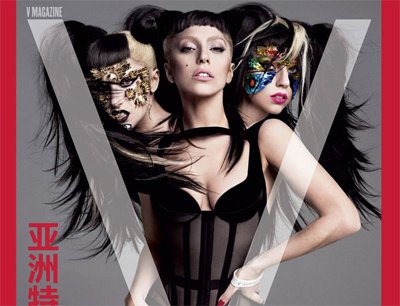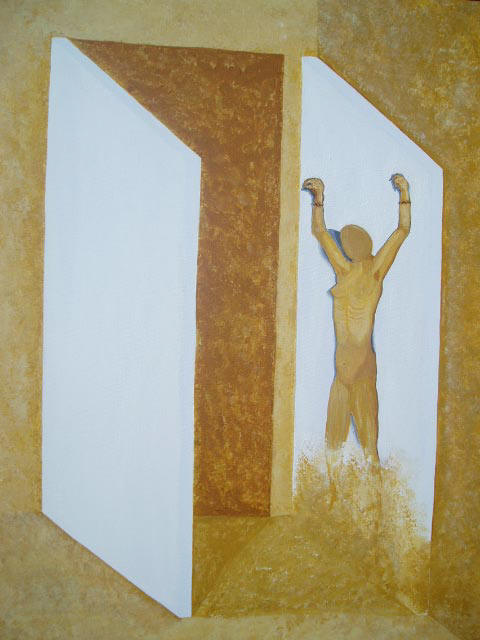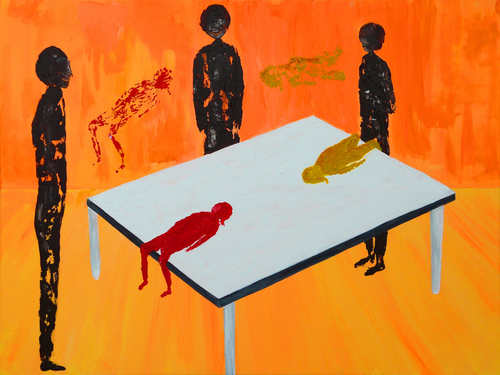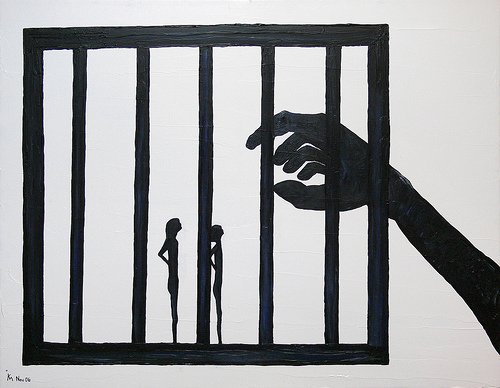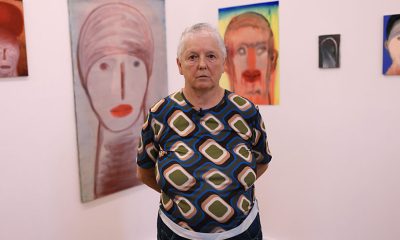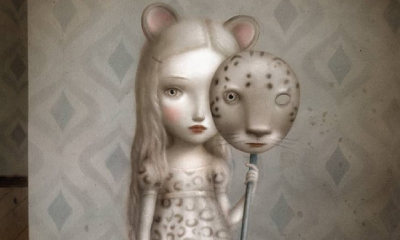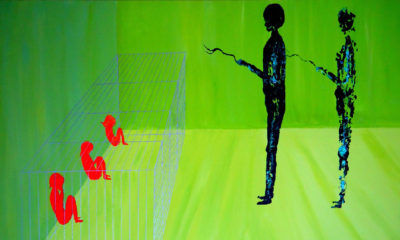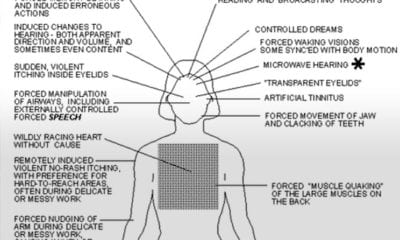Vigilant Reports
Kim Noble: The World of Mind Control Through the Eyes of an Artist with 13 Alter Personas
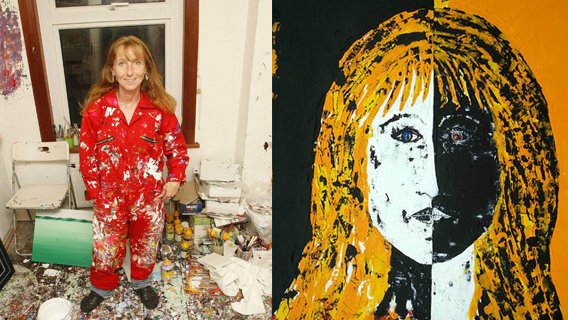
Kim Noble is a rare occurrence: a trauma-based mind control survivor with over 13 alter personas who don’t know each other but who all paint. She has suffered DID and MPD (dissociative identity disorder and multiple personality disorder) for most of her life, as a result of an extremely traumatic childhood. Each one of her alters paints with a personal and distinctive style but they all have one thing in common: they reveal the dark world of mind control programming, from its horrific techniques to its symbolism. We’ll look at the works of this unique artist who reveals a world that is totally hidden from the masses.
Many articles on this site point out the presence of mind control symbolism in popular culture. Photo shoots, music videos, and movies often glamorize and trivialize mind control and its symbolism by associating it with famous stars and trendy happenings. The fact, however, remains that these references celebrate one of the most abominable practices known to man: trauma-based mind control, also called Monarch programming. Originating from the secret CIA project called MK-Ultra, Monarch programming subjects its victims to some of the most sadistic tortures conceivable (for more details on Monarch programming see the article entitled Origins and Techniques of Monarch Mind Control).
The works of Kim Noble vividly document the life of a mind control slave through the eyes of 13 alter personas. While a few of these alters paint peaceful landscapes and nature scenes, most of them depict horrific aspects of mind control such as physical torture, electroshock, violent abuse, dehumanization and dark occult rituals. The stories told by these paintings are almost too much to bear, yet they likely actually happened to Kim Noble as they precisely reflect accounts of other Monarch survivors. Looking at the works of Kim Noble not only reveals gritty details of an abominable practice carried on by “elite” organizations, it reveals the symbolism that is also thrown in our faces on a daily basis through corporate-owned mass media. Let’s look at the life and works of Kim Noble.
Who Is Kim Noble?
I have the feeling that Kim Noble herself would have trouble answering this question. Here’s the biography found on her official website.
“Kim Noble is a woman who, from the age of 14 years, spent 20 years in and out of hospital until she made contact with Dr Valerie Sinason and Dr Rob Hale at the Tavistock and Portman Clinics. In 1995 she began therapy and was diagnosed with Dissociative Identity Disorder (originally named multiple personality disorder). D.I.D is a creative way to cope with unbearable pain. The main personality splits into several parts with dissociative or amnesic barriers between them. It is a controversial disorder but Kim has had extensive tests over 2 years by leading psychology professor at UCL, John Morton, who has established there is no memory between the personalities and that she has the misfortune of representing the British gold standard over genuine dissociation.
Having no formal art training, Kim and 13 of her personalities (alters) became interested in painting in 2004 after spending a short time with an art therapist. These 12 artists each have their own distinctive style, colours and themes, ranging from solitary desert scenes to sea scenes to abstracts, collages, and paintings with traumatic content. Many alters are unaware that they share a body with other artists.
What is remarkable to all is both the quality of their work and the speed of their progress. Within five years of starting to paint they have already had seventeen successful solo exhibitions and participated in an equal number of group exhibitions. Kim was also the first Artist in Residence at Springfield University Hospital in Tooting, South West London.”
– kimnoble.com
Despite the fact that she has to live with 13 alter personas – who randomly take control of her body – Kim Noble is fortunate enough to be living a relatively normal life. The fact that the programming stopped at a young age has helped her become “well-adjusted”. She has a teenage daughter named Aimee, who was mostly raised by the motherly alter named Bonny.
In the past few years, Kim Noble enjoyed some mainstream exposure and was featured in national newspapers such as The Telegraph, The Guardian, The Independent and several others. She even appeared at the Oprah Show, where she was interviewed and was shown switching personas. As you might expect from mainstream media, the coverage of Noble’s condition was extremely superficial and focused on exploiting the “freak” aspect of her condition for shock value. The true cause of her condition, trauma-based mind control, which is extensively described in her works, is almost never mentioned.
Although most articles and interviews about Noble “applauded” her courage and whatnot, none of them dared to discuss the core message of her work and the system that it describes. Many of Noble’s paintings depict terrible scenes of organized, institutionalized and systematic violence, torture, and child abuse combined with elaborate occult symbolism. It is obvious that the trauma Noble went through was not caused by a single sadistic father but by an organized entity that held many children. However, to most newspapers, Noble’s work is nothing more than an example of “outsider art” (a term popularized by trendy art-world douches to identify art created by people with mental problems). Most observers are fascinated by the fact that each one of Noble’s alters paint with a distinctive style, but it’s as easy to recognize that her collective works describe her past as a Monarch programming victim.
The “real” Kim Noble does not recall any of the abuse she suffered – several of her alters do, however, and they express all of it in their paintings.
“To all intents and purposes, each of Kim’s personalities is an artist in their own right: Patricia paints the solitary desert landscapes, Bonny’s pictures often feature robotic dancing figures or “frieze people”, Suzy repeatedly paints a kneeling mother, Judy’s canvasses are large, conceptual pieces while Ria’s work reveals deeply traumatic events involving children.
These disturbing images are at the root of Kim’s extraordinary condition; DID is a creative mental survival strategy whereby the personality splits at a young age due to severe and chronic trauma. The number of personalities that exist often depends on how long the trauma lasts. But Kim herself has no memory of being abused as a child; she has been protected over the years by her alters.
“I’ve been told I was abused and to me at this moment in time, it’s too much. It goes in one ear and out the other. It’s no good retraumatising me and telling me something I don’t want to know – in any case, there would be a switch.”
Kim has good reason to fear learning about her past as it’s possible that if she acquires too much information, she won’t be able to cope and will “disappear”. It’s happened twice before. (omega)
This is where it gets really weird – for Kim isn’t Kim at all. The personality I am interviewing is Patricia and it is she who manages her and Aimee’s lives, but Patricia wasn’t always the dominant personality. Before Patricia took over, Bonny held the fort and two years previous to Bonny, it was Hayley.
Kim watches me closely as she explains: “You see Kim is just the ‘house’, the body. There isn’t a ‘Kim’ at all – she has completely split. So we answer to the name Kim but really I am Patricia. When people call us ‘Kim’ I suppose many of us just assume it’s a nickname, but once people know you they don’t use your name very often in conversation.”
Of the 20 or so personalities who share “Kim”, some are easily identifiable: there is 15-year-old Judy who is anorexic and bulimic, maternal Bonny, religious Salome, depressed Ken, sensible Hayley, Dawn, Patricia and elective mute MJ. There are also a handful of children “frozen” in time. A few of the alters know about the DID but many are unaware – or refuse to accept it.
“Judy doesn’t believe in the DID,” explains Kim. “She’s only a teenager and she calls our therapist a nutter when she tries to explain it to her. She’s so young, she doesn’t even think Aimee is her daughter. She knows about me and she thinks that I’m a terrible mother because I’m always leaving Aimee. To her, it’s totally normal to keep coming and going. She probably thinks that you come and go too.”
There are certain “triggers” that can force a change and gradually Kim has learnt what they are in order to avoid them – but it doesn’t stop her switching up to three or four times a day.”
– The Independent, “Kim Noble, a Woman Divided”
Let’s look at some of the works created by some of Kim Noble’s alters as they each provide a different look at the shady world of Monarch programming. Regular readers of the Vigilant Citizen might realize that a lot of the symbolism found in Noble’s paintings are also found in popular culture.
Warning: Several of these paintings depict disturbing scenes which might not be suitable for young or sensitive readers.
Bonny
Bonny, who was Kim’s “dominant” alter for a few years, is a warm and motherly figure. Most of her paintings portray humans as mechanical robots – which is one of the ways one could describe a mind control slave. Other pieces are more directly related to Monarch programming such as this one, aptly titled “I’m Just Another Personality”.

“I’m Just Another Personality” visually represents the splitting of the subject in several alters. The central figure or the core personality has become simply “another personality”. It is blindfolded, representing the victims’ total blindness to its condition.
This kind of imagery is sometimes found in popular culture by acts that exploit mind control imagery.
Another piece made by Bonny, ironically named I-Test, symbolically depicts the reality of a mind control slave.

“I-Test” portrays a blank, emotionless face with blindfolded eyes. The skull is cracked, representing the fracturing of the psyche. One of the eyes is bloody and we can assume that it has been poked out. The symbol of the missing/hidden eye is extremely important in the world of Monarch mind control. It symbolically represents the loss of half of the victim’s vision of the world – the other half being “taken out” and controlled by the handlers. In occult symbolism, the emphasis on one eye can refer to the Eye of Horus, the All-Seeing Eye, a symbol of the occult elite.
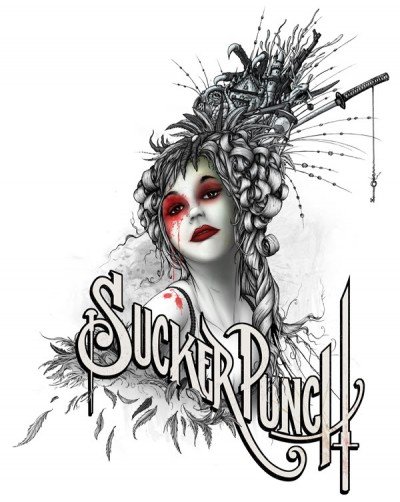
A promotional t-shirt of the movie Sucker Punch (which was all about Monarch Programming – see “Sucker Punch” or How to Make Monarch Mind Control Sexy) featuring a bloodied eye.
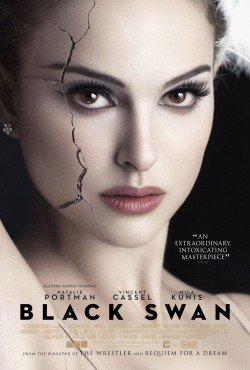
A cracked face on a promotional poster of Black Swan – another movie with heavy mind control elements.
Golden Dawn
Golden Dawn is the alter that saw the birth of her daughter Aimee. However, Dawn believes that Aimee is still a baby and does not recognize the teenage girl that lives with her. The name “Golden Dawn” has a heavy occult connotation as it is the name of an important and powerful secret society that taught Hermetic Kabbalah, astrology, occult tarot, geomancy, and alchemy to its initiates. It held within its ranks prominent occultists such as Arthur Edward Waite and Aleister Crowley. The process of Monarch mind control combines state-of-the-art “science” (if you can call torture “science”) with ancient occultism, whether it be in hermetic theories, kabbalistic symbolism or invocation rituals. It is, therefore, no surprise that she was given this occult-inspired name.
Her piece entitled “The Naming” visually depicts the process of creating and naming a new alter.
“The Naming” is an auto-portrait of Kim with one eye that was removed from the face and placed above her, bloody, which conveys the violent nature of the process. Once again, mind control is symbolized by the loss of an eye which appears to have been replaced by a text/poem that was probably used to program her.
Most of Dawn’s other paintings feature limbless, mannequin-like figures who are subjected to various methods of torture.
Key
The alter “Key” appears to have a profound understanding of the process of mind control and its underlying occult aspect. The name “Key” might refer to terms such as the “Key of the Mysteries” or “Solomon’s Key” as she seemed to have been programmed to understand some of the occult concepts utilized in mind control. Most of this alter’s works describe the programming process as a kabbalistic “Great Work”, with the Tree of Life (the main symbol of the Kaballah) as the main object of focus.
“It Happens” is an extremely detailed work describing the several layers of programming required to traumatize and program a mind control victim. The title “It Happens” is a disabused way of saying that … all of this really happened.

“It Happens” is comprised of overlapping layers surrounding a central figure: a helpless person strapped to a bed. The head is symbolically “decapitated” from the body using a line, representing the concept of dissociation. Each one of the overlapping layers contains a set of pictographs representing either traumatic events or occult symbolism. The outer layer depicts scenes of victims being electroshocked, hung from a tree, being caged, raped (sometimes with animals), caged, buried alive and more. From this outside layer, arrows point towards the second layer, which contains zodiac signs. According to F. Springmeier, zodiac signs are used as a code to assign and file body programs. The center layer surrounding the victim contains words such as “Hell”, “Devil”, “Blood” and “Kill” which are shock words used to further traumatize the victim.
This one, entitled “Golden Kaballa”, uses the same basic layout as the previous image but replaces scenes of trauma with occult symbols and the central figure with the kabbalistic Tree of Life. Each one of the Tree of Life’s colorful spheres, named Sephiroth, are used in Monarch mind control as “compartments” to store alter personas. The outer layer of the work contains the name of each of the ten spheres of the Tree of Life with its associated Hebrew letter.
By overlapping the trauma depicted in “It Happens” with occult aspects of “Golden Kabballah”, we get a complete idea of the process of mind control. They schematize, with near mathematical precision, a process that is described by authors on mind control such as Fritz Springmeier.
“The Cabala is synonymous with Hermeticism or Hermetic magic. The Cabala was jewish-babylonian magic. The jewish black magicians brought it to Europe. It began to get widespread notice in Europe after Enlightenment period. The great pyramid according to the occult is a symbol of the Cabalistic Tree of Life–the branches of the tree form the four streams or lines to the base of the pyramid. Because the Cabala is the basis of their hermetic magic, Illuminati systems will be fairly consistent in the make of a slave’s internal Tree of Life and Tree of Evil. (…)
The rooms of the tree of life have names. Essentially, every Illuminati hierarchy victim, has the Cabalistic tree of life placed in them. This tree lies below the other trees. The circles that make up the internal Cabalistic Tree of Life are called rooms or quads by the various survivors. Alters can use the internal Tree of Life to work magic internally. It also reminds deeper alters of cult control. The circles of the tree are rooms that can be entered into. Mt. Qabbalah is a figurative mountain in the Cabala.”
– Fritz Springmeier, The Illuminati Formula to Create a Mind Control Slave
This next piece, entitled “Seven Levels” is another highly detailed account of the process of dissociation.
Comprised of several layers, this works depicts, from bottom to top, the “evolution” of a slave from the hell of trauma to the “heavenly” feeling of dissociation. The bottom two layers depict several horrific scenes of trauma. For example, we see in the bottom left corner a pregnant woman giving birth to a dead child in a pool of blood under disturbing phrases such as “No Life”, “Death” and “Blood Death All Around”. There are also several caged children, others being electroshocked and others hung upside down. Inverted crosses are found all around these two bottom layers, reminding us that these traumatic events are Satanic Ritual Abuse (SRA).
All of this trauma, pain, and suffering seems to be “channeled” towards the layers above, consisting of a plethora of occult symbols such as the Tree of Life, the signs of the zodiac and All-Seeing eyes. It is at this occult level that the transformation occurs.
The top layer represents the (only) escape to all this trauma: dissociation. It is represented by an angelic figure rising to the sky. Looking closely, however, we see an All-Seeing Eye in the sky, which reminds us that this escape is not true freedom, but a controlled state that has been induced by the handlers.
Judy
This alter is a teenage girl who is anorexic. Most of her paintings place a heavy emphasis on the concept of duality – one of the most basic occult concepts exploited by mind control rituals. Duality is an ancient hermetic concept which is traditionally represented with the juxtaposition of the colors black and white, as with the Masonic checkerboard pattern or the symbol of the Ying Yang.
Judy’s works often give a prominent place to the Masonic checkerboard floor, the surface on which occult rituals and ceremonies take place in secret societies. She was probably heavily exposed to the concept of duality (good girl vs evil girl – something that is also found in popular culture) and the symbol of the checkered floor was probably physically used during programming.
“Crying Rose” fully exploits the theme of duality used on mind control victims to create a “split of personality”. The crying girl, who is dressed in a checkered dress, reflects the checkerboard pattern floor, therefore insinuating that duality is occurring within her.
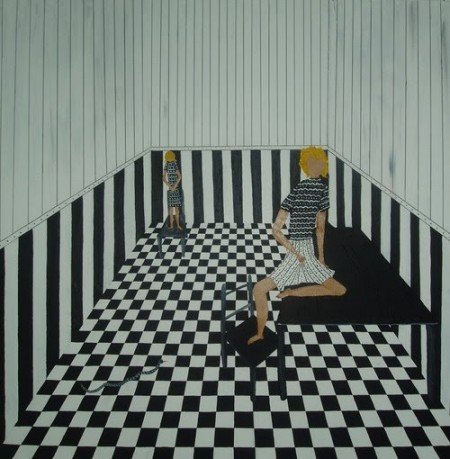
This piece, titled “Symbolic or What”, is indeed … symbolic. Two girls (or two personas of the same girl) avoid stepping on the checkerboard floor due to the presence of a snake. They appear to be covering their genitals, implying that the snake is a phallic symbol. The painting also attests to the great psychic power of the checkerboard pattern on victims, a trait that was probably part of the programming.
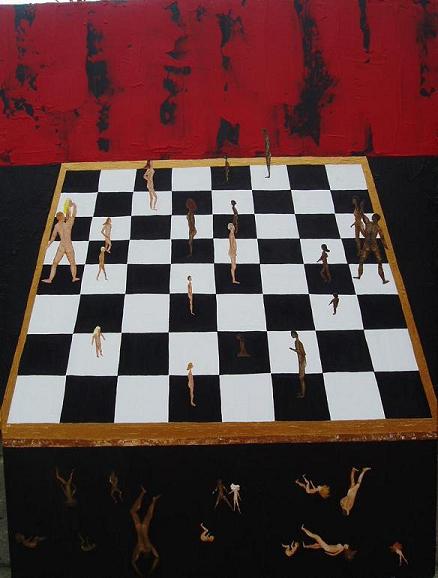
This painting portrays Monarch slaves as literal pawns on a chessboard, who are “played with” to then be disposed of by their handlers.
This self-portrait depicts Judy as a person divided into opposite entities. The concept of duality is therefore very present and represented by the juxtaposition of the colors black and white. The shock words and insults on the image recall the violent and abusive process that leads to the fragmentation of the personality.
Ria Pratt
The paintings made by Ria Pratt are the most graphic and disturbing but also the most revealing. The alter believes she is a 12-year-old girl and has vivid recollections of the trauma she has been subjected to, whether it be physical or dehumanizing. Simply watching these paintings is a difficult experience – it is further disheartening to realize that she actually lived these situations.
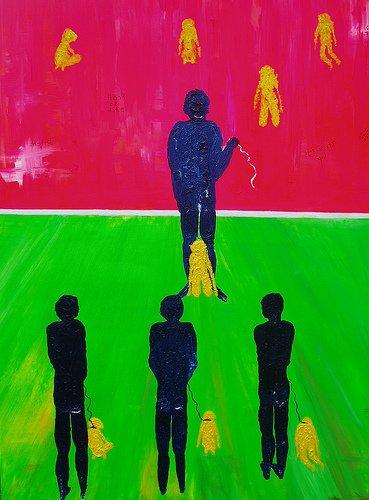
“It’s a Dog’s Life” depicts mind control victims being held on a leash like dogs – a technique to humiliate and dehumanize the victims. Notice the “transparent” version of the children floating in the air, representing their dissociated alter personality. An inscription on the wall says “Pratt Was Here” which emphasizes the fact that she saw and lived these things first hand.

Entitled “Too Much”, the painting depicts a victim being electroshocked by a handler with a sick smile. The pain is “Too Much” to handle, resulting in the victim’s dissociation.

“What Ted Saw” depicts the abuse of a small child by its handlers. “Ted” is the small Teddy Bear sitting on the floor. Young mind control victims are often given Teddy Bears by their handlers to make them develop an emotional attachment to them. This attachment is then exploited by the handlers to create emotional trauma.
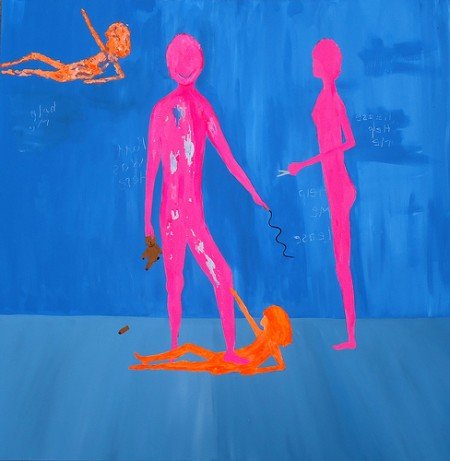
In “Ted’s Legless”, Ria’s handler rips off one of her best friend’s legs while forcibly holding her on the ground. The trauma causes dissociation, which is represented by the transparent version of the girl. Haunting words are inscribed on the wall: “Help Me Please” and “Pratt was Here”.

The symbol of a teared up teddy bear sometimes utilized by mass media in works containing hidden references to mind control. This scene from a music video from pop singer Jessie J which contains several references to Monarch programming.

“Unspeakable” depicts the unspeakable: the abuse of small children by their handlers. Strange phrases a written on the wall along with an inverted cross, a symbol that appears to be hardwired into the brains of Monarch slaves.

“No No!” depicts a forced abortion or premature birth. The bloody operation is witnessed by Ria, probably to traumatize her. According to Ellen P. Lacter, fetuses are either sacrificed in rituals or used as slaves.
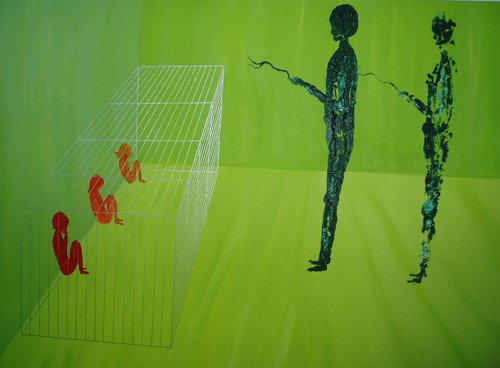
Children caged up like animals about to be tortured by a handler (who also appears to have dissociated).
In Conclusion
Although Kim Noble enjoyed some mainstream exposure, the true source of the artist’s condition – Monarch programming – is nowhere to be found in mass media. Analyzed in its entirety, Noble’s body of work describes a highly organized and complex system that appears to hold great amounts of knowledge- occult and scientific – as well as material resources. This system also appears to literally own humans, mostly children, who are abused and traumatized to create within them programmable alter personas. The fact that no newspapers dared to investigate (or even mention) anything related to MK-Ultra, a program that was proved to use the exact techniques described in the paintings, tells volumes about the power of those operating it. The soulless handlers depicted in Noble’s paintings are not lone psychopaths, but high-level officials of the Illuminati system who enjoy media immunity. In fact, they are sometimes part of the media as the worlds of the entertainment business and Monarch programming often collide.
Partly for this reason, the symbolism used during Monarch programming has spilled over to the mainstream entertainment business. Some of the world’s biggest stars are products of mind control. The same symbols used in the programming of Monarch slaves are sent to the world through mass media. High-level mind control handlers and slaves (those who have “succeeded” at the various levels of programming) end up operating in show business. Some of our favorite entertainers are nothing more than puppets whose strings are pulled by unseen handlers. These handlers are “unseen” to most, but they certainly make themselves “seen” through the symbolism placed in the media.
Many of the symbols described on this site directly originate from the shady world of Monarch programming, which uses a complex system of occult images and powerful triggers. Although most of us are fortunate enough not to live through the hell endured by these MK slaves, we are still subject to a form of programming using movies, television, music and other forms of mass media. Those who operate behind the scenes attempt to slowly normalize their existence and their depraved behavior. Sadly, reality is sicker than fiction.
- Mockery Ensues
- Official seal of the University of Chile
- New footage shows debauched birthday party Diddy threw for Meek Mill
- The Economist / 2025 / The World Ahead
- Justin Trudeau claims fighting climate change is more important than feeding your kids
- Suspect at center of ISIS inspired Election Day terror plot previously worked for the CIA
- Nina Saemundsson's "Prometheus Bringing Fire" (Los Angeles McArthur Park, circa 1937)
Get an e-mail notification as soon as a new article is published on The Vigilant Citizen.
-

 Latest News2 months ago
Latest News2 months agoThe Controlled Demolition of Diddy
-
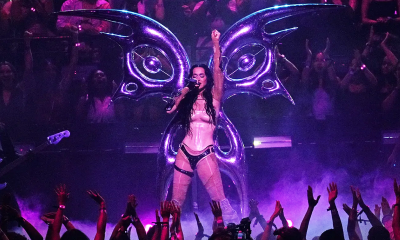
 Music Business2 months ago
Music Business2 months agoThe Hidden Meaning of Katy Perry’s Highly Symbolic Performance at the 2024 VMAs
-

 Pics of the Month2 months ago
Pics of the Month2 months agoSymbolic Pics of the Month 09/24
-
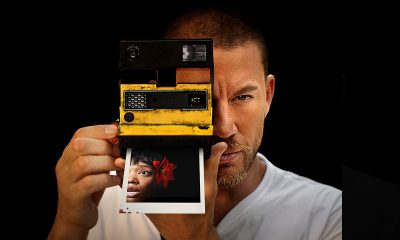
 Movies and TV1 month ago
Movies and TV1 month agoAn In-Depth Look at the Hidden Meaning and Symbolism in “Blink Twice”
-

 Pics of the Month4 weeks ago
Pics of the Month4 weeks agoSymbolic Pics of the Month 10/24
-

 Music Business3 months ago
Music Business3 months agoSomething’s Terribly Wrong With Sabrina Carpenter and her Video “Taste”
-

 Movies and TV2 months ago
Movies and TV2 months agoAn In-Depth Look at the Dark Messages and Symbolism in “Longlegs”
-

 Latest News2 weeks ago
Latest News2 weeks agoKamala’s Campaign Was Objectively the Worst in Recent History
